Martin Edwards's Blog, page 53
September 7, 2022
Exciting Times

When I wrote on 29 August that an exciting week lay ahead, I wasn't exaggerating. I have had the great good fortune to see The New York Times give The Life of Crime a fine review and then, just a few days later, to read a wonderful review of Blackstone Fell in The Times. These are the sort of things a writer dreams of. And then, among other things, there has been a fantastic in-depth appraisal of The Life of Crime by the film historian David Bordwell for which I'm truly grateful.

Events have come thick and fast, including a podcast with Lucinda Hawksley, the biographer and descendant of Charles Dickens, and an interview with Ann Cleeves in Carlisle. Over lunch, Ann and I had the pleasure of reading the reviews of our new books in The Times and reflecting that it wasn't always like this for either of us...
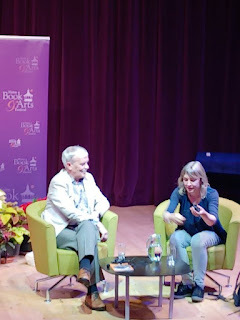
After Carlisle, I spent a lovely evening in Birnam with book dealer Scott Herbertson and his family. Next morning, it was off to Nairn, for a couple of events as part of the Nairn Book and Arts Festival. I also had a sandwich lunch watching the cricket on the sea front at Nairn in the sunshine - a lovely way to spend the time. In the evening, a very convivial dinner with Jennifer Henderson, biographer of Josephine Tey (our joint event together is pictured above) and her equally delightful mum Christine.
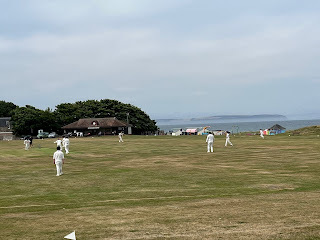
The trip to Nairn involved a much longer drive than I've had since my car accident two months ago. It's an 800 mile round trip, so I spent Sunday relaxing and sightseeing around places like Forres (site of the Nelson Tower, the photo at the top of this post, which put me in mind of Blackstone Tower!), Brodie Castle, Elgin, Hopeman, Lossiemouth and Findhorn. A chance to recharge the batteries and also to think about forthcoming writing projects - I have quite a few things lined up for when I have finished work on Sepulchre Street, Rachel Savernake's fourth case.



September 5, 2022
Farewell My Lovely - 1975 film review
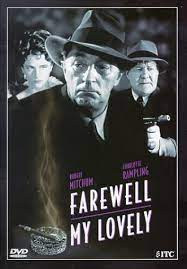
The 1975 version of Farewell My Lovely, based on Raymond Chandler's novel, is widely acclaimed. The first time I saw it, many years ago, I was underwhelmed, but I decided to give it another try and I'm glad I did. Second time around, I was more impressed by Robert Mitchum's interpretation of Philip Marlowe. Originally I felt he was too old for the part and not quite suited to it anyway. On reflection, I think he does a better job than I realised.
Perhaps I was simply in the right mood for the film this time. Mood and atmosphere are extremely important to the film (which is set in 1941) and the director Dick Richards did a good job on that score. Speaking of scores, David Shire's music is also well-suited to the film. The screenplay by David Zelag Goodman (whose other credits include The Eyes of Laura Mars) avoids falling into the trap of pastiche.
Quite apart from Mitchum, the cast is very strong. Moose Malloy, the huge bank robber who is crazy about a missing woman called Velma, and hires Marlowe to find her, can't have been easy to cast, but Jack O'Halloran, a former boxer whose first film role this was, does a great job. The famously sultry Charlotte Rampling is good as Helen Grayle, while Sylvia Miles makes the most of a smaller part, the alcoholic Jessie Florian: her performance earned her an Oscar nomination and deservedly so. Fascinatingly, Judge Grayle is played by the legendary hardboiled writer Jim Thompson. There's even a part for the young Sylvester Stallone.
This film isn't in the same league as Polanski's Chinatown, which was released a year earlier, but even though it lacks originality, I now think it's very effective entertainment. As with books, some films definitely improve on a second look.
September 2, 2022
Forgotten Book - A Question of Time
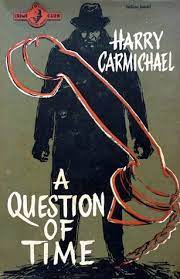
A Question of Time, published in 1958, seems to have been the first of Harry Carmichael's stand-alone novels. He was best-known, like so many other Collins Crime Club authors, for his series - one written under his own name and featuring Piper and Quinn and another written as Hartley Howard featuring Glenn Bowman. Here he stretches beyond his comfort zone.
The result is a smoothly accomplished mystery. The viewpoint character is Martin Kennedy; however, the story is told in the third person rather than by Martin himself. I suspect this is because Martin is, in a number of ways, not an easy character for readers to sympathise with. He's having an affair with one woman and is being pursued by another, while his wife is out of town. He's also rather dense at times. No real surprise, then, when he winds up as a prime suspect in a murder case.
The victim is his lover, Felicity, whose body he discovers when visiting her home in the company of her husband, amiable Richard Campbell. The plot complications flow thick and fast. As the title suggests, much depends upon timings. It's a sort of update of Freeman Wills Crofts in that respect. There's even a diligent policeman.
Thjs is a quick read, quite well-written and not lacking in pace. Unfortunately, I figured out whodunit early on, even though the precise technicalities underpinning the culprit's scheme eluded me. The fact is, I'm always much more interested in motive than means when reading mystery stores and that's why I was able to anticipate the 'surprise solution'. So, for me, this one is only a partial success.
September 1, 2022
Publication Day - Blackstone Fell
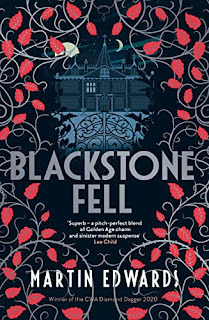
No matter how many books one publishes, the very first appearance of a new novel is always exciting. And today sees the official publication by Head of Zeus of my twenty-first novel, not counting collaborative efforts. Blackstone Fell is the third book to feature Rachel Savernake and Jacob Flint and the very first novel of mine to include a locked room puzzle at its heart (although there are other mysteries to be solved as well). It's a book that, for a variety of reasons, I'm really proud of.
But it's one thing for an author to feel reasonably satisfied with a novel (and we all know that achieving perfection is impossible, however much we try). It's quite another for that novel to meet with the approval of others. And while Blackstone Fell is, I hope, a very entertaining story, it's also one that places some demands on the reader. There's plenty of humour in the story, but also quite a bit of darkness and a good deal of mysterious complexity. It's not a pastiche but an attempt to rework Golden Age concepts in a fresh way.
So it's truly encouraging when a reviewer with high standards and expertise 'gets' what one is trying to do. And the initial reaction to the novel in the blogosphere is enormously heartening. Take Puzzle Doctor, for instance, who says: 'One of the strengths of this book is the finale. I can tell you now, if you think that you've solved this, you haven't...I seriously doubt that any armchair sleuth will solve this, despite playing perfectly fair with the reader. There's far more to it than just that, though, with the intriguing central character...vivid descriptions...and a plot that never stands till while never meandering from what you need to see. A must read.'
The blog tour has also got off to a great start - the latest lovely review coming from amwbooks - lots of great quotes there! I'm hugely grateful to Intensive Gassing about Books, What Cathy Read Next, Two Heads are better than one, and Bookish Jottings who have posted reviews already. It's very gratifying when readers unfamiliar with my work find that it entertains them and I'm pleased to see the comments indicating that you can start reading the series with the new book - you don't necessarily have to begin at the beginning with Gallows Court if that isn't convenient. Thanks to everyone who has taken or is taking the time and trouble to read and comment on the book. This sort of reaction makes the writing life feel really worthwhile!
August 29, 2022
An exciting week
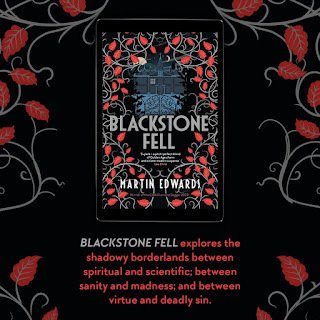
Tomorrow sees the US publication of The Life of Crime, and marks the start of a very interesting few days. On Thursday, Head of Zeus publish my third novel featuring Rachel Savernake and Jacob Flint, Blackstone Fell, a book I'm excited about. On Friday I'm interviewing Ann Cleeves in Carlisle and, after a stopover in Birnam, I'll be heading to the Nairn Book Festival, where among other things I'll be in conversation with Josephine Tey's biographer, Jennifer Morag Henderson.
Blackstone Fell is a book I dreamed up and wrote during the pandemic, although the original glimmer of inspiration came a little earlier, when I visited Salomons Tower in Kent. A post-lockdown trip to Hardcastle Crags in Yorkshire gave me the main elements of the setting, and a trip to Kinver Crags was also helpful. I've written an article about the book's locations for TripFiction and there's also a piece about Golden Age crime that will be appearing in the Daily Express, as well as short essays in Shots and Crime Time. A little closer to Christmas, My Weekly will be featuring the book alongside a new short story in the Golden Age vein which brings back a character I've written about previously.
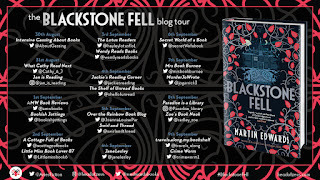
Sophie, the publicist working with Head of Zeus on the novel, has kindly arranged a very extensive blog tour, involving bloggers who in general haven't covered my work in the past. It will be interesting to see what they make of the book. Suffice to say that ingredients include a locked room mystery, a cipher, a sanatorium, a seance, and a Cluefinder. Yep, it's a complex puzzle all right. I enjoyed writing the story enormously and I hope crime fans will enjoy reading it.

The Life of Crime has already received quite a bit of coverage in the US, including this podcast with the American Scholar magazine. An article on CrimeReads - discussing an obscure Russian writer and his unexpected connection with E.R. Punshon - is also imminent. So - lots going on. And meanwhile, I'm working on the closing chapters of Rachel's next adventure - Sepulchre Street.
August 26, 2022
Forgotten Book - Death on Romney Marsh
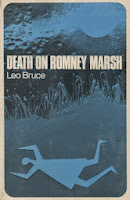
In my quest for fictional representations of Romney Marsh, as with Doctor Syn, my eyes lighted on a copy of Leo Bruce's Death on Romney Marsh. First published in 1968, it's another Carolus Deene mystery and it's certainly an example of Bruce's agreeable storytelling style, heavily based on dialogue. There isn't, in fact, too much description of Romney Marsh, although in the first chapter we're told that the low-lying lands 'cover even today some of the loneliest country in southern England', while names like Dymchurch and Dungeness suggest Swinburne's 'mile on mile on mile of desolation' (a slight mis-quote from his poem 'By the North Sea').
Carolus is visiting his aunt, Vicky Morrow, who rents a house on the Marsh called Mortboys. The chap who owns it, a man called Cuchran, wants her out of the place so that there can be 'development' (it's an eternal issue in Britain...) Relations between Cuchran and Miss Morrow are very poor, because she has long accused him of murdering his first wife - for the insurance money, as well as to inherit her property.
Carolus sets off to negotiate with Cuchran and finds him to be suitably unpleasant and clearly with something to hide. In the end, Carolus manages to persuade Cuchran to relent on his plans, and there the matter rests for some time. But then Carolus's interest in the case is re-ignited by the mysterious disappearance of Cuchran's enigmatic old butler, Mowlett.
I enjoyed the fact that this is quite an unorthodox story, with various unlikely twists and turns, all presented with Leo Bruce's customary wit. He really was an engaging writer. The main problem with the book is that the crime at the heart of the story is far-fetched, not because there is over-reliance on coincidence, but because the actions of the people in question are almost impossible to believe. So, no masterpiece, but a pleasant if undemanding read.
August 24, 2022
A Perfect Spy - DVD review
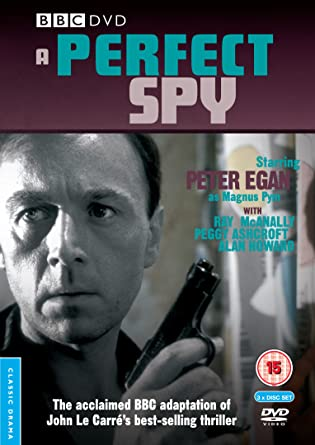
I missed the BBC TV version of John le Carre's A Perfect Spy when it was screened way back in 1987. The series had a strong pedigree, with a screenplay by Arthur Hopcraft, a very good writer who graduated from soccer journalism to high-calibre TV writing. The cast is strong, with one truly stand-out performance, but I must admit there were times when the seven episodes felt more like twenty-seven. Fast-paced it isn't. And for me, it isn't a patch on the TV version of The Night Manager.
The story begins in the present. People are waiting in a car to catch up with Magnus Pym. It's not clear what is going on. And then we go into an extended flashback that takes up almost the entirety of the seven episodes. We learn what has brought Magnus Pym (Peter Egan) to a quiet seaside town (I recognised Dawlish, which I enjoyed visiting for the first time back in September).
The key to Pym's life is his relationship with his father, Rick. Rick Pym is a con man, and it's no secret that the story fictionalises, in some respects, the relationship that le Carre had with his own very dodgy Dad. It's an interesting relationship, for sure, and links in closely with the theme of betrayal that is hammered home rather insistently in the script.
The difficulty for me stemmed, oddly enough, from the sheer brilliance of Ray McAnally's performance as Rick. He is a monster, but with a human side, and although McAnally was a fine actor, I doubt if he ever surpassed his interpretation of Rick Pym. Even Peter Egan,a very likeable actor in his own right, seems colourless in comparison. When McAnally was on screen, I was gripped. But at other times, the story was so unexciting and protracted that I found it difficult to care. Which I didn't expect.
August 23, 2022
Dual Alibi - 1947 film review
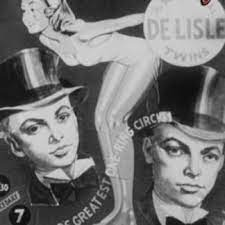
If I'd watched Dual Alibi a year or two earlier, I'd probably have given it a mention in The Life of Crime. This 1947 British film fits, thematically, into the chapter where I discuss the work of William Lindsay Gresham, Fredric Brown, and others. I'd say it's one of the best examples of film noir to have emerged from the UK in the Forties. And it provides a rare starring role for that interesting actor Herbert Lom, today better remembered as the crazed cop in the Pink Panther movies.
Most of the story is told in flashback after circus owner Vincent Barney (played by Ronald Frankau, whose brother, the writer Gilbert, dabbled in crime fiction) recognises a sandwich board man. I'm not sure the flashback method was the best way of telling the story, but it works moderately well, and the ending is downbeat and poignant.
The main story concerns two French identical twins, both played by Lom. They are the de Lisle brothers, a fearless pair of trapeze artists. Barney hires them and brings them over to Blackpool as a star turn in his circus. He hires the services of a rascally publicist, Mike Bergen (Terence de Marney) who has a glamorous girlfriend, Penny, played by Phyllis Dixey, whose real life story was interesting and rather sad.
It's a low budget film, but surprisingly effective in its moodiness and sense of things spiralling downwards and out of control. Very noir, in other words. Herbert Lom is excellent, and the supporting cast are also good. Recommended.
August 20, 2022
Forgotten Book - The Demoniacs
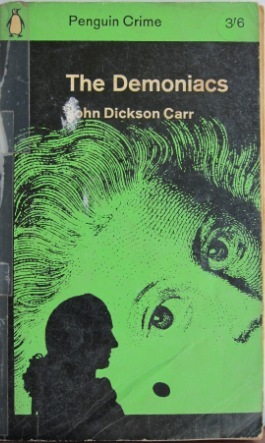
The Demoniacs, first published in 1962, is one of the historical mystery novels in which John Dickson Carr specialised in the later stages of his career. Like Carr, I'm fascinated by history, and I share his view that historical fiction offers the novelist rich possibilities. In this story, set in 1757, his protagonist is Jeffrey Wynne, a Bow Street Runner, and this choice reflects his interest in the history of policing in Britain, another appealing subject in its own right.
The title of the book is intriguing, and it's rather a pity that it is, as Doug Greene says in his biography of Carr, of little relevance to the storyline. The cast of characters includes Henry Fielding, himself later a lead character in one or two other mystery novels, and Laurence Sterne of Tristram Shandy fame, here seen as a rather disreputable clergyman.
As ever with Carr, the atmospherics are very well done and complement the action effectively. What of the action itself? Well, Jeffrey has been sent to France by Sir Mortimer Ralston to bring back to England Sir Mortimer's headstrong (but beautiful) niece Peg. She risks being imprisoned in Newgate Jail for 'harlotry'. The central mystery concerns the death of an old woman.
The book begins quite vividly, but I'm afraid that within a few chapters, I'd lost interest. This is partly because the dialogue is slightly wearisome, but mainly because the story is - at least to me - lacking in grip. I've been a Carr fan since my teens, but - like Christie and Sayers among many others - not every book he wrote was a winner. Doug Greene acknowledges the weaknesses, and points out a significant mistake that Carr made in the clueing (though authors are only human - if this had been the only flaw in the book, it would have been easily forgiven as far as I'm concerned). Alas, long before the end, I'd ceased to care about either the characters or the puzzle.
August 17, 2022
R.I.P. June Thomson and Michael Pearce
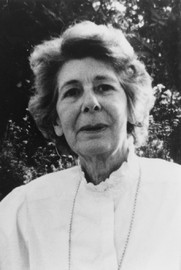
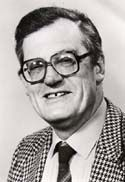
I was so sorry to learn of the very recent deaths of June Thomson and Michael Pearce, two crime writers with whom I've enjoyed many pleasant conversations. They were likeable and engaging people who, in very different ways, made notable contributions to the genre. At the time I was putting together Howdunit on behalf of the Detection Club, of which they were both long-standing members, they were both rather frail and I wasn't sure that they would feel able to contribute. But both of them really did want to be part of the project, and I was truly delighted to have the opportunity to include their essays.
As I recall, I first met June at the launch of one of her books; my memory is a little hazy, but I believe it was Past Reckoning, which was published to coincide with the London Bouchercon of 1990. I was invited to attend the do in my capacity as a reviewer and writer about crime - at that point, my first novel was yet to see the light of day. Over the years, I had many opportunities to chat to June, often at CWA conferences after I'd become established as a novelist. Her first novel was published twenty years before mine, but she was always interested and encouraging.
June was a former teacher who made a radical but effective change of course during her writing career. She established a considerable reputation with a long series of well-written novels featuring Chief Inspector Jack Finch (who was re-named Rudd in the US, to avoid confusion with another series detective called Finch). Her early books drew comparisons with P.D. James, whose style resembled hers in some ways, and she seemed destined to become an equally prominent figure in the genre. Despite her great success, that never quite happened, and only three more Finch books appeared after 1991, as she began to concentrate her energies more on stories of a very different kind - about Sherlock Holmes. There are countless Holmes pastiches, but June's stories were truly outstanding.
Having admired her work for a long time (her first novel was published way back in 1971) I was thrilled when June wrote a couple of original short stories - 'Deus Ex Machina' and 'Coming Home' - for anthologies I was editing. To publish her work was both a pleasure and a privilege. She also wrote a terrific biography, Holmes and Watson. I treasure my inscribed copies of her books and I shall miss her.
I first got to know Michael Pearce and his wife Bridget about fourteen years ago, but I'd come across his Mamur Zapt books long before that. Michael was highly convivial and very good-natured. He would modestly describe himself as a writer, teacher and administrator in academia, but he was keenly interested in human rights and an individual of considerable distinction and achievement. There's quite a lot more that can be said about both Michael and June, but the first thing I want to do by way of personal tribute is to read some of their wonderful books again.



